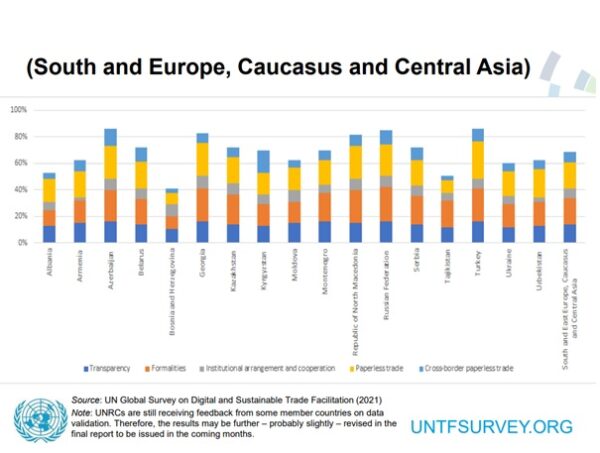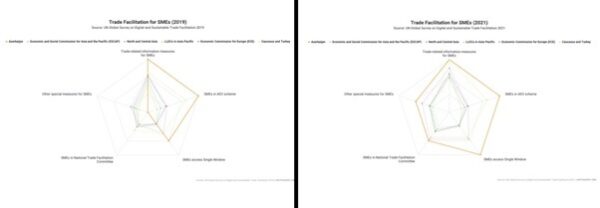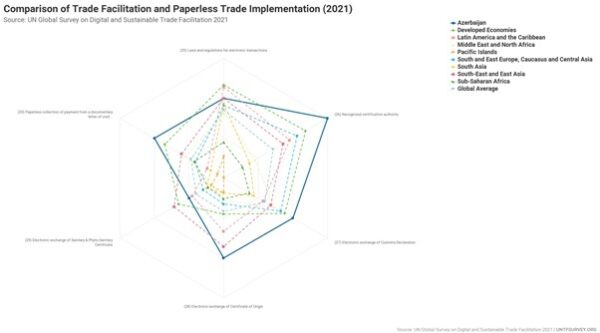Azerbaijan takes a leading position in trade facilitation in UN Global Survey 2021
July 14, 2021, saw the launch of the results from the 2021 UN Global Survey on Digital and Sustainable Trade Facilitation, made available on the interactive website. Azerbaijan has continued its upward path in trade facilitation (hereinafter TF) advancement, exhibiting further improvements since the previous Survey from 2019.
The Survey covers over 140 countries and 50 TF measures specified in the WTO Trade Facilitation Agreement (TFA), Paperless Trade and the Framework Agreement on Facilitation of Cross-border Paperless Trade in Asia and the Pacific (CPTA) and Sustainable TF measures (for SMEs, agriculture, women). The 2021 Survey also included 2 new groups of measures: Trade finance facilitation measures and Trade facilitation in times of crisis. The Survey is conducted by the five UN Regional Commissions along with a growing number of global and regional partners every two years.
(Table 1)

The global average of trade facilitation implementation stands at 65% and 68.8% in the overall South and East Europe, Caucasus and Central Asia region. Within this context, Azerbaijan exhibited an impressive overall trade facilitation score of 86.02% in 2021. As such, the country has gained the leading position among the CIS countries (Russia – 84.95%, Georgia – 82.8%, Iran – 77.42%, Armenia – 62.37%) and Central Asian countries (SPECA) on digital and sustainable trade facilitation (Kazakhstan – 72.04%, Uzbekistan – 62.37%, Kyrgyzstan – 69.89%). Azerbaijan ranked 9th in the survey on trade facilitation and paperless trade in Asia and the Pacific (ESCAP).
The breakdown of the evaluation of trade facilitation measures for Azerbaijan is as follows:
Transparency – 100%;
Formalities – 91.67%;
Institutional Arrangement and Cooperation – 88.89%;
Paperless Trade – 85.19%;
Cross-Border Paperless Trade – 66.67%.
Taken together, this is also a significant improvement from the country’s trade facilitation score of 81.72% from 2019.
(Table 2)

General Trade Facilitation scores comparison between 2019 and 2021.
Source
The scoring of the Survey has been applied based on 4 possible outcomes: 0: Not implemented; 1: Planning stage; 2: Partially implemented; 3: Fully implemented.
In addition to the General Trade Facilitation Measures, Azerbaijan has exhibited exemplary scores in sub-categories such as Paperless Trade Facilitation, SME Facilitation Measures and Agriculture Facilitation Measures.
The measures in the Paperless Trade Facilitation category include Automated Customs System, Electronic Single Window System, Electronic submission of Customs declarations, Electronic application and issuance of Preferential Certificate of Origin, and the e-Payment of Customs Duties and Fees – all of which Azerbaijan has now “Fully implemented”, achieving maximum scores.
Agriculture Facilitation and SME Facilitation Measures count towards the Sustainable TF measures. Azerbaijan has shown great improvements within these categories compared to 2019. In the former, Azerbaijan has “Fully implemented” all four measures, compared to three measures from the previous year.
(Table 3)

In the latter – SME Facilitation – the country has “Fully implemented” three measures and “Partially implemented” the remaining two, which also illustrate a significant increase from 2019, as illustrated in Table 4.
(Table 4)

Furthermore, Azerbaijan has become one of the first countries to sign the Framework Agreement on Facilitation of Cross-Border Paperless Trade in the Asia-Pacific Region, which entered into force on February 20, 2021.
Many of these improvements have been supported by the implementation and ongoing development of the Digital Trade Hub (DTH) of Azerbaijan. The DTH is a cross-border e-commerce platform that simplifies export procedures for local SMEs, foreign investors and businesses globally. Built for the development of the digital infrastructure for cross-border e-Trade, the DTH connects different stakeholders and policy areas across sectors, borders and institutions, facilitating the legal movement of goods between countries. The DTH platform was built in public-private partnership between the Center for Analysis of Economic Reforms and Communications, PASHA Bank, B.EST Solutions and AzerTelecom.
The DTH has also supported Azerbaijan in exemplifying improved results in the cross-border paperless trade category, which was highlighted as a challenge on a global scale. In 2021, Azerbaijan’s cross-border paperless trade score has increased from 50% in 2019 to 66.67%. This is well above the global average as well as the average in its region, as visualised in Table 5.
(Table 5)

“Countries across the globe continue to move towards a more seamless trading environment. The implementation of WTO TFA+ measures increased 5 percentage points across 128 countries since the last survey in 2019. Benefitting from the opportunities of global value chains is predicated on states’ continuous pursuit of trade facilitation. From the simplification of bureaucratic trade procedures to their digitalisation, trade facilitation efforts aim to reduce the time and costs of cross-border transactions. Beyond enhancing the global economy, this helps increase national trade competitiveness and support sustainable development,” notes Jana Krimpe – UNNExT’ Expert in the UN Network of Experts for Paperless Trade and Transport in Asia and Pacific, founder of B.EST Solutions and founder of the Public Association “Supporting Women in Tech” – Femmes Digitales.
“Thanks to the Decree of the President of the Republic of Azerbaijan on additional measures for strengthening the position of Azerbaijan as a digital trade hub and expansion of foreign trade operations, the country has started to implement cross-border e-Signatures mutual recognition schemas with several countries around the world. This is taking place under the management of the Center for Analysis of Economic Reforms and Communications in cooperation with other government institutions. It offers a wide range of useful e-services including m-Residency, online company registration, issuance of a virtual address, opening online bank accounts, issuance of free sales certificates and much more. The DTH was put in place to simplify everything related to international export by digitalising and automating all paperwork and payments as well as eliminating bureaucracy,” Mrs. Krimpe adds.
“The reduction of trade costs can make or break a country’s integration with regional and global value chains. In order to maximise trade as a driver of growth and sustainable development, it is therefore crucial for countries to recognise and pursue the most valuable areas of change. In addition, more efforts to design and implement TF measures for women and for achieving gender equality and the empowerment of all women and girls are needed. The latest reforms and digital transformation initiatives in Azerbaijan could increase its position as a leading country in cross-border eTrade and create the fundamental base for cross-border data flows,” Mrs. Krimpe concludes.
The Survey has been conducted by The United Nations Regional Commissions (UNRCs) since 2015, in cooperation with UNCTAD, ICC, OECD and many other organizations. The UNRCs are currently in the process of finalising feedback from some member countries on data validation. Results may therefore be slightly revised in the final report to be issues in the coming months.
